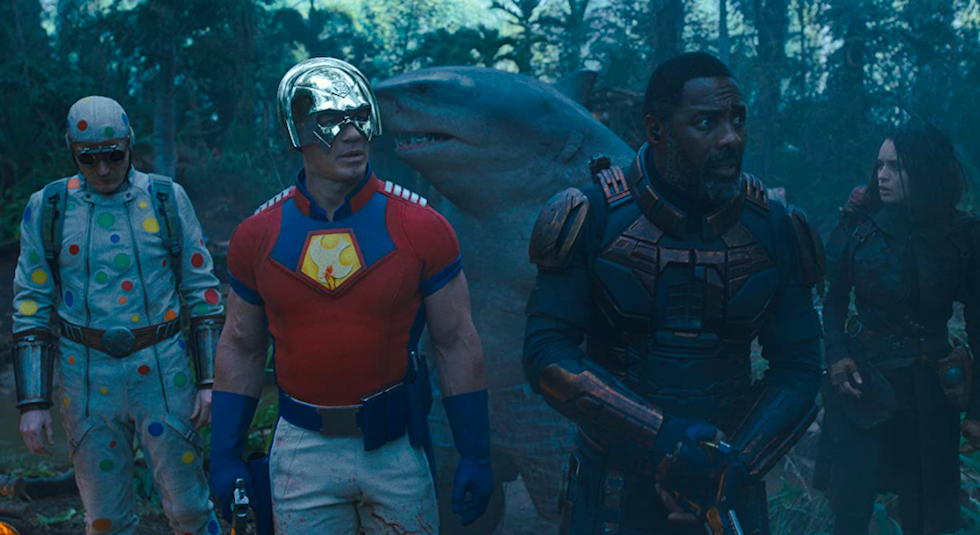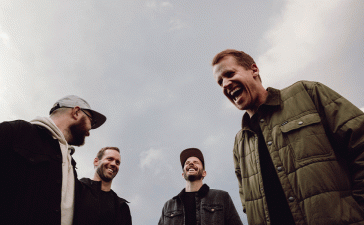Having made his mark on the Marvel Cinematic Universe with the Guardians of the Galaxy flicks, Troma scion James Gunn turns his attention to the Distinguished Competition with his new film, The Suicide Squad.
Another day, another squad, another pile of bodies heaped to the rafters. Much like the 2016 Suicide Squad, The Suicide Squad (that definitive article is an important point of difference) sees a motley crew of second-string villains – plus fan fave Harley Quinn (Margot Robbie) press-ganged by the shadowy arm of the U.S. government to undertake an insanely dangerous mission in return for reduced sentences. Odds of survival are not high, hence the title.
The difference this time is that the writer and director is James Gunn. Better known now for his work on Guardians of the Galaxy, Gunn came up in the ranks of happy schlockmeisters Troma Entertainment, cutting his teeth on low-budget, high-concept, girls ‘n’ gore comedic extravaganza.
That’s the sensibility he’s bringing to the table here. The Suicide Squad is huge fun, and it’s hugely violent; while you may have your favourites among the impressive cast – Idris Elba, John Cena, Joel Kinnaman, Sylvester Stallone, Viola Davis, Jai Courtney, Peter Capaldi, David Dastmalchian, newcomer Daniela Melchior, Pete Davidson, Michael Rooker, et al. – don’t expect them to make it to the end credits – this Suicide Squad lives up to its name.
Reflecting on how he picked who lived and who died in his supervillains-on-a-mission opus, Gunn says, “It was really just a matter of the story. There are a lot of shocking deaths and I knew that I needed to find some characters to be a part of that particular set of people. It was really just about taking these characters I loved and had different attributes that were good for the story.”
What is surprising to learn is that Gunn doesn’t plan ahead when writing his scripts. With this kind of big-budget ($185m US) tentpole feature, you’d expect the creative process to be micromanaged by the good bean counters at WB. Not so, it seems – at least in the first draft.
“I sort of just let the story be the master,” he muses. “Like inspiration is the master. It’s about allowing myself to be relaxed enough while I’m writing to be a conduit for that stuff happening. In a way, I don’t choose those deaths; in a way, I’m a journalist of the imagination – I’m just kind of watching what happens and taking it down. And sometimes it surprises me – there are a couple of people who get killed, especially as we get closer to the end, who my heart breaks for.”
That’s true for the audience as well. If there’s one prominent theme running through Gunn’s body of work, it’s the notion of “Family of Choice” – the idea that misfits and misanthropes can find comfort in each other, and in doing so can become, if not heroic, then certainly better than their worst impulses. It’s a personal theme for him.
“I’m interested in people who have difficulty connecting with other people and finding small ways that damaged characters can connect. Because that’s me: I come from a crazy, dysfunctional background, and I have a hard time connecting with other people. And through a lot of discipline and a lot of work on myself, I’m able to start to deal with other people.
“Basically, my movies are made for people like that: for people who don’t feel like they belong, for people who have made some terrible choices, for people who are not all good, which none of us are. We aren’t superheroes. We definitely aren’t Captain America. I think most of us are closer to Polka Dot Man in this world than we are to Captain America.”
The Suicide Squad very much feels like a James Gunn joint – bold, anarchic and weirdly but affectingly heartfelt. If the writer/director had any shackles on, they were the lightest possible, yet he still admits to some trepidation to playing around on such a big scale.
“I feel a lot of responsibility in a way,” he says. “Because when I came to Warner Brothers, they were so cool about me wanting to really make a movie that was a full James Gunn experience, and being entrusted with that and a large budget, I felt a responsibility to take chances. There are a lot of chances in the movie, and they aren’t the things that we think of: it’s not the shark ripping the guys in half, because that’s fun, gory, goofy stuff. It’s the way that the film moves, and the way we’re surprised by characters. To me, to be able to have all that stuff in the middle of the more outrageous things – that is the biggest risk of the movie.
“I mean, at the end of the day, the Suicide Squad for me is about these characters who are unable to make connections. They’ve had shitty, terrible lives, and have made even worse choices for their lives, and they don’t know how to connect to other people. And they start to, just a little bit.”



